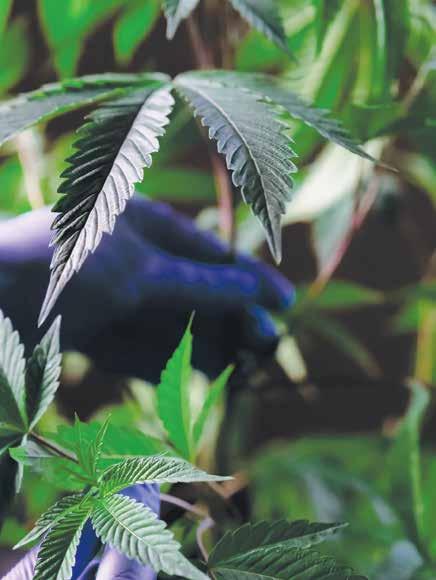
3 minute read
This is Bigger than Bud
Dr. Mila K. Marshall CNW Cannabis Corner Editor
Just two short years ago in 2021, The Black Farmer Restoration Act was introduced in the House of Representatives by State Rep. Sonya Harper which aimed at righting the injustices directed toward Black farmers and ranchers in Illinois. A year after marijuana became legal in Illinois the fight for Black farmers flew smoothly under the radar of social equity-minded investors and entrepreneurs.
Advertisement
Failing to see the intersections of inequity costs the Black economy tremendously. Black farmers have been lobbying and advocating for years against inequitable treatment by federal and state departments of agriculture. As marijuana has matured and gained momentum, it is time to clearly connect the narrative. The War on Drugs made hemp illegal to plant, yet the war on Black farmers existed before the policing of one plant.
Black farmers across the nation have organized for decades alleging the USDA limited access to low-interest rate loans and other discriminatory practices subsequently forcing foreclosures and loss of millions of dollars. Not having access to the same financial tools, grants, programs, or insurance protections because of race is not unique to the agricultural sector. Considering the prevalence of banking inequity coupled with government assistance being kept away no wonder it is challenging for the Black economy to get its bearings.
Connecting a national movement through cannabis may very well be the beginning of a broader and more informed coalition. Cannabis is an agricultural commodity but how it is regulated separates how it is talked about. The attention to marijuana and social equity for prisoners harmed by biased policies is real. The harms done to Black farmers are just as egregious and disruptive to the Black economy. Black-owned farmland has dropped by 90% according to reports from Data for Progress and according to the 2017 U.S. Agricultural census of the 3.4 million farmers in America only 1.4% identify as Black.
Access to assistance has been the tool to dismantle Black businesses. For the first time, race doesn’t determine access to resources. For the most part, the primary barrier is that marijuana is federally illegal, and all are subjected to finding capital in novel ways. However Black farmers are still pushing to get their fair share according to a recently published NPR article titled
“Black farmers call for justice from USDA.” Black hemp growers are just as in need of some social equity energy as those in the adult-use recreational space.
Hemp in Illinois 101
In 2015 Illinois researchers at universities got the opportunity to grow hemp for educational purposes through the Industrial Hemp pilot Program. Three years later the Industrial Hemp Act would be approved in the 2018 U.S. Farm Bill (also called the Agriculture Improvement Act of 2018). The expanded law gave access to farmers and processors to cultivate and create secondary products from hemp plants. The hemp sector has oversight similar to marijuana. There is an application fee of $100 as well as testing and reporting requirements for growers.
All Illinois hemp farmers are required to submit reports on harvest to the Illinois Department of Agriculture (IDOA). Hemp testing ensures plants have less than 0.3% THC. Any hemp that tests over 0.7% THC must be destroyed. Testing is carried out by accredited and approved third-party labs.
Of the eight labs listed as approved on the IDOA website three are outside of Illinois; Ionization Labs in Austin, TX, Minova Labs in Lafayette, CO and SC Laboratories California LLC in Santa Cruz, California Because hemp is federally legal unlike marijuana, samples can be transported via mail. As of the publication date of this article, there are no Blackowned cannabis testing labs in the state of Illinois.
Black cannabis is bigger than bud.
The lure of profits has eyes wide for how billions of dollars can be funneled into Black communities and economies. Knowing the intersection of issues is a flex and indeed the learning curve for cannabis is steep. Cannabis will continue to grow, but the Black community and allies cannot afford to shade adjacent communities that have been on the frontline of agricultural policy work. What we don’t want is for the powers that be to take advantage of our social equity spotlight on prisoners as a cue for we are not going to dismantle the entire system of racially biased policies and access to resources for every sector. Our fight for access to wealth building is bigger than bud.









